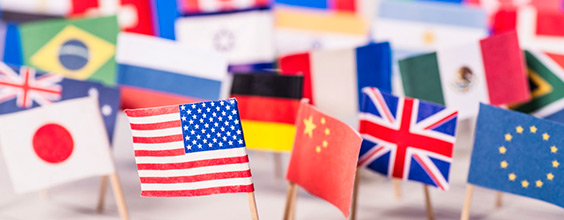The Lighthouse® is the weekly email newsletter of the Independent Institute.
Subscribe now, or browse Back Issues.
Volume 20, Issue 31: July 31, 2018
- Getting Beyond Immigration Deadlock
- New Ammo in the Trade War: Farm Aid
- Secrets to Authoritarians’ Success
- Will California Voters Ease Property-Tax Protections?
- The Beacon: New Blog Posts

On June 27, House Republicans saw their immigration bill go down in flames by a vote of 121 to 301. A defeat of such magnitude could actually help break the decades-long gridlock on immigration reform—provided that moderate Republicans take home the right lessons. In an op-ed for the Washington Times, Independent Institute Senior Fellow Benjamin Powell explains why.
“Any immigration reform bill that stands a chance of becoming law, with the current Congress or in the foreseeable future, will need to be less restrictive than the ones the Republicans just proposed,” Powell writes. “That’s a good thing, not just for immigrants, but for native born Americans as well.”
Powell, who has reviewed most of the economics literature on immigration for his book on the subject, finds that the negative consequences of immigration are very small compared to the benefits. “Immigrants create about as many jobs as they take, and they don’t depress wages of the vast majority of Americans,” he writes. Powell argues that congressional Democrats should sign on to funding a border wall in exchange for the creation of a legal pathway to U.S. citizenship for immigrants brought to the United States illegally as children. Hopefully, as public opinion continues to become increasingly pro-immigrant—a trend observed across decades of opinion polls, Powell says—a politically viable bill for legalizing the 11 to 12 million immigrants in the country illegally will get traction.
Ending the Gridlock on Immigration Reform, by Benjamin Powell (The Washington Times, 7/16/18)
The Economics of Immigration: Market-Based Approaches, Social Science, and Public Policy, edited by Benjamin Powell
Global Crossings: Immigration, Civilization, and America, by Alvaro Vargas Llosa

Last week, President Trump announced his commitment to provide $12 billion in emergency aid to help American farmers cope with falling agricultural demand resulting from retaliatory tariffs enacted by the nation’s trade partners. The payments, which are scheduled to begin two months before the mid-term elections in November, illustrate the maxim that one bad policy usually begets another. In the case of trade restrictions, few advocates ever bother trying to identify and quantify all the costs of import tariffs and quotas, as Independent Institute Senior Fellow Robert Higgs notes in his latest post at The Beacon.
Even under a best-case scenario, one in which a trade war resulted in universal free trade, Higgs notes that “the question would remain: were the benefits of attaining this result by means of a trade war great enough to justify bearing that war’s undeniable costs?” The costs would include the value of output forgone due to labor underutilization and reduced private investment (“regime uncertainty”) and the reduced output of goods and services resulting from having a less efficient, less wealthy global economy.
Best-case scenarios, however, seldom prevail—especially not in the case of government economic intervention. Once tariffs are enacted, they are notoriously difficult to eliminate because they create concentrated benefits among an easily organized few and they spread the costs among the difficult-to-organize many. (The same is true of farm subsidies.) For these reasons and others, Higgs writes, “the idea of a win-win trade war is the height of folly so far as economic rationality is concerned—not to mention its further suppression of economic liberties already being crushed by taxes and regulation.”
The Delusion of a Win-Win Trade War, by Robert Higgs (The Beacon, 7/26/18)
Taking a Stand: Reflections on Life, Liberty, and the Economy, by Robert Higgs. Foreword by Judge Andrew P. Napolitano

Some of the world’s leading authoritarians—strongmen such as Vladimir Putin, Xi Jinping, Recep Tayyip Erdoğan, and Mohammed bin Salman—have managed to create loyal constituencies eager to keep them in power despite the many deprivations suffered by their compatriots. Just back from the World Cup games in Putin’s Russia, Independent Institute Senior Fellow Alvaro Vargas Llosa sheds light on these authoritarians’ success secrets.
“Although they speak ill of Putin in Russia’s big cities, they idolize him in the smaller ones and in the countryside, and the system has so far enabled him to maintain power and enlarge his global footprint,” Vargas Llosa writes. Putin has leveraged nationalist sentiment to his advantage, as have China’s Xi and Turkey’s Erdoğan; Saudi Arabia’s Bin Salman has used the trappings of modernism to excuse his brutal policies. Collectivist ideology is essential to their success, but it’s not the only ingredient.
Significantly, all of these authoritarians have kept some semblance of private enterprise alive to maintain their regimes’ economic—and hence political—viability. Had Venezuela’s Nicolás Maduro denationalized industries seized by his predecessor Hugo Chavez, the economy probably wouldn’t be such a disaster, and he might not be facing as much popular dissent as he is. Which isn’t to say that authoritarianism “works” in any meaningful sense of the term. “Authoritarianism does not constitute a ‘model’ because it does not rest on a set of values,” Vargas Llosa writes. “It rests on a set of malignant practices whose aim is to maintain power in the hands of an anointed few.”
How Authoritarians Use Capitalism to Bolster Their Oppressive Regimes, by Alvaro Vargas Llosa (Investor’s Business Daily, 7/20/18)
The Che Guevara Myth and the Future of Liberty, by Alvaro Vargas Llosa
Liberty for Latin America: How to Undo Five Hundred Years of State Oppression, by Alvaro Vargas Llosa

In 1978, in the face of rising inflation and property values, California voters passed a major ballot initiative that restricted the growth of taxes on commercial and residential property. For 40 years, critics have blamed Proposition 13 for just about every problem that the state and local governments have faced. Yet much of what people believe about Prop 13 is false, explains Independent Institute Research Fellow Gary M. Galles in a recent op-ed published in the Orange County Register and elsewhere.
Most commonly, the critics of Prop 13 blame it for depleting state and local public coffers—ignoring that government revenues and spending per capita have continued to grow. Critics also ignore the growth in various charges, fees, and assessments—taxes in all but name—that Californians are forced pay.
“Examining real (inflation-adjusted) state and local revenue and expenditures per capita trends reveals that California had already passed its pre-Prop. 13 peaks by 1989,” Galles writes. “By 1990, real per capita expenditures for welfare, police and fire were higher than their pre-Prop. 13 peaks, and education was only slightly lower.” Today it’s even harder to attribute budget shortfalls or spending gaps to Prop 13. But whether or not enough voters will learn this lesson before November, when they will decide the fate of Prop 13’s protections for commercial property, is a different matter.
Proposition 13 Is Still a Poor Scapegoat for Poor Government, by Gary M. Galles (The Orange County Register, 6/19/18)
California Dreaming: Lessons on How to Resolve America’s Public Pension Crisis, by Lawrence J. McQuillan
- Pay for Play on Capitol Hill, by Craig Eyermann
- The Delusion of a Win-Win Trade War, by Robert Higgs
- Why Dozy DMV Is Dangerous, by K. Lloyd Billingsley
- Proposition 47 a Smashing Success for Criminals, by K. Lloyd Billingsley
- Will Janus Decision Mean Payback Time for Workers?, by K. Lloyd Billingsley






